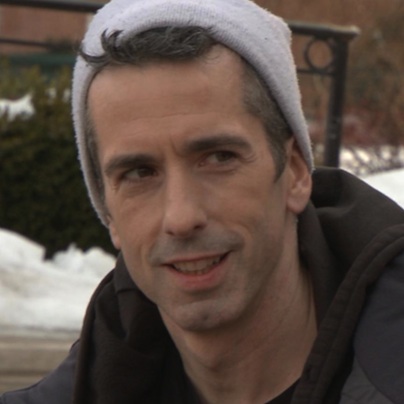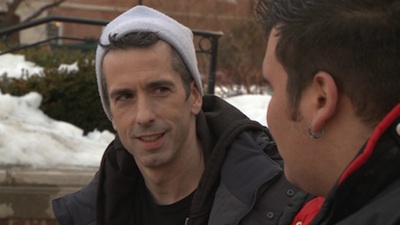Arts & Entertainment
Savage views
Gay advice columnist has new MTV sex show


Dan Savage chats with a young gay University of Maryland student about his sex life in an early episode of ‘Savage U,’ a new MTV sex advice show. (Photo courtesy MTV)
The Blade caught up with Dan Savage last week — he’s plugging his new MTV show “Savage U” (Tuesdays at 11 p.m.) and took a few minutes out of a dizzying schedule of writing advice columns, editing newspapers, hosting the new show and being an anti-bullying advocate — in addition to being a family man — to riff on this and that.
BLADE: There’ve been so many cable sex advice shows over the years — the old MSNBC shows, Sue Johanson and even MTV’s own “Loveline” with Dr. Drew and Adam for those of us old enough to remember it. What can yours add that hasn’t been done before or does every generation need its own sex advice show?
SAVAGE: Hopefully what I bring to it is what I bring to “Savage Love” (his syndicated advice columnist which runs locally in City Paper) — a sex-positive, kink-positive take and one that embraces pleasure as a legitimate goal that celebrates people’s desire. A lot of what I’ve seen is really kind of sex negative that starts first with no, then with maybe. “Savage Love” works its way from maybe to yes to yes, definitely … there’s a school of thinking that says, “Oh my God, you can’t have sex if there’s any risk,” but there’s risk in all kinds of things. What needs to be discussed is how to mitigate the risk as much as possible but then at a certain point yes, you have a right to go for it. You also have to be able to shoulder the consequences. … There’s always a risk but you don’t hear people advocating against sky diving or snowboarding. There’s a whole bunch of people who will drop dead today from eating chicken salad and yeah, you’d be an idiot to leave it out in the sun for three days and then eat it, so we can apply that same brainy shit to sex.
BLADE: How do you get these college students to go on the air and say, “I have herpes” or “I’m a virgin.” Are you involved in finding them or do producers do that?
SAVAGE: There are producers who do that ahead of time. I need to be hearing about their stories for the first time when we film, so there are layers of producers who vet them ahead of time. There are a lot of old farts like me who think YouTube and Facebook and Twitter and all that is something new and always will be, but for somebody who’s 19 and basically grew up with this stuff, they have different attitudes about privacy … we’ve started some taping and then stopped ….
BLADE: Why? What would be an example of someone whose story shouldn’t be aired?
SAVAGE: This was someone who obviously had a deeper-seated medical issue that became evident on camera and we felt talking about the issue would have unfairly outed the person and would have been kind of dishonest so we unplugged the mics … we try to be honest and honor the kids without exploiting anyone.
BLADE: You seem so much nicer on the show than in your column where you often seem very exasperated and caustic. Why?
SAVAGE: Well I told someone in the premiere episode they were an idiot so I’m a little caustic here and there on the show but I think in the column, some of it is having to boil so much down to fit the space that it can make me seem more caustic and sarcastic than I am. I’ve had people say for the podcast I seem so much nicer but that’s the benefit of being able to run my mouth. It’s a different venue … also on the show, I’m a lot more willing to cut these kids some slack because they’re 18. I’m a lot more patient with an 18-year-old fuck up than I am with a 38-year-old fuck up. It’s like of course you’re fucked up when you’re 18 because 18 is fucked up anyway.
BLADE: Are you of the school of thought that a Santorum nomination would have been better for Obama than a Romney nomination or does any Santorum success cause you to shudder?
SAVAGE: I agree with Bill Maher on that — I don’t trust the American people enough to have (had) Santorum be the nominee. This is a country that elected Bush, at least once, he stole it the first time, but I would take Romney over Santorum though they’re two bars set so low they’re basically on the floor.
BLADE: What is the most pressing sex question you see from gay men?
SAVAGE: Male fear of intimacy is real and so it’s doubled with gay men. That comes up a lot. I also hear from young gay guys, like 15, 16, 17, 18 who say there’s no one for them to date. Their straight peers have been dating since the middle school dances but they’ve been alone or they say there are only older gay guys to date and I tell them dating starts later a lot of times for us so they don’t have a lot of options. Also monogamy comes up a lot. Gay guys are also guys so often it becomes an issue of non-monogamous relationships that are grounded in trust and disclosure rather than lying and cheating and running around.
BLADE: How do you have time to add a show to your busy schedule?
SAVAGE: Terry is a stay-at-home dad — that hetero-normative model of having a stay-at-home wife, that shit is awesome if you can afford it. We’re lucky in that regard.
Photos
PHOTOS: Montgomery County Pride in the Plaza
LGBTQ celebration held in downtown Silver Spring

Montgomery County Pride in the Plaza was held on Sunday, June 29 at Veterans Plaza in Silver Spring, Md.
(Washington Blade photos by Michael Key)























The fifth annual Fredericksburg Pride march and festival was held on Saturday, June 28. A march through the streets of downtown Fredericksburg, Va. was followed by a festival at Riverfront Park.
(Washington Blade photos by Michael Key)



















India
Anaya Bangar challenges ban on trans women in female cricket teams
Former Indian cricketer Sanjay Bangar’s daughter has received support

Anaya Bangar, the daughter of former Indian cricketer Sanjay Bangar, has partnered with the Manchester Metropolitan University Institute of Sport in the U.K. to assess her physiological profile following her gender-affirming surgery and undergoing hormone replacement therapy.
From January to March 2025, the 23-year-old underwent an eight-week research project that measured her glucose levels, oxygen uptake, muscle mass, strength, and endurance after extensive training.
The results, shared via Instagram, revealed her metrics align with those of cisgender female athletes, positioning her as eligible for women’s cricket under current scientific standards. Bangar’s findings challenge the International Cricket Council’s 2023 ban on transgender athletes in women’s cricket, prompting her to call for a science-based dialogue with the Board of Control for Cricket in India and the ICC to reform policies for transgender inclusion.
“I am talking with scientific evidence in my hand,” Bangar said in an interview posted to her Instagram page. “So, I hope, this makes an impact and I will be hoping to BCCI and ICC talking with me and discussing this further.”
On Nov. 21, 2023, the ICC enacted a controversial policy barring trans women from international women’s cricket. Finalized after a board meeting in Ahmedabad, India, the regulation prohibits any trans player who has experienced male puberty from competing, irrespective of gender-affirming surgery or hormone therapy. Developed through a 9-month consultation led by the ICC’s Medical Advisory Committee, the rule aims to safeguard the “integrity, safety, and fairness” of women’s cricket but has drawn criticism for excluding athletes like Canada’s Danielle McGahey, the first trans woman to play internationally. The policy, which allows domestic boards to set their own rules, is slated for review by November 2025.
Bangar shared a document on social media verifying her participation in a physiological study at the Manchester Metropolitan University Institute of Sport, conducted from Jan. 20 to March 3, 2025, focused on cricket performance. The report confirmed that her vital metrics — including haemoglobin, blood glucose, peak power, and mean power — aligned with those of cisgender female athletes. Initially, her fasting blood glucose measured 6.1 mmol/L, slightly above the typical non-diabetic range of 4.0–5.9 mmol/L, but subsequent tests showed it normalized, reinforcing the study’s findings that her physical profile meets female athletic standards.
“I am submitting this to the BCCI and ICC, with full transparency and hope,” said Bangar. “My only intention is to start a conversation based on facts not fear. To build space, not divide it.”
In a letter to the BCCI and the ICC, Bangar emphasized her test results from the Manchester Metropolitan University study. She explained that the research aimed to assess how hormone therapy had influenced her strength, stamina, haemoglobin, glucose levels, and overall performance, benchmarked directly against cisgender female athletic standards.
Bangar’s letter to the BCCI and the ICC clarified the Manchester study was not intended as a political statement but as a catalyst for a science-driven dialogue on fairness and inclusion in cricket. She emphasized the importance of prioritizing empirical data over assumptions to shape equitable policies for trans athletes in the sport.
Bangar urged the BCCI, the world’s most influential cricket authority, to initiate a formal dialogue on trans women’s inclusion in women’s cricket, rooted in medical science, performance metrics, and ethical fairness. She called for the exploration of eligibility pathways based on sport-specific criteria, such as haemoglobin thresholds, testosterone suppression timelines, and standardized performance testing. Additionally, she advocated for collaboration with experts, athletes, and legal advisors to develop policies that balance inclusivity with competitive integrity.
“I am releasing my report and story publicly not for sympathy, but for truth. Because inclusion does not mean ignoring fairness, it means measuring it, transparently and responsibly,” said Bangar in a letter to the BCCI. “I would deeply appreciate the opportunity to meet with you or a representative of the BCCI or ICC to present my findings, discuss possible policy pathways, and work towards a future where every athlete is evaluated based on real data, not outdated perceptions.”
Before her transition, Bangar competed for Islam Gymkhana in Mumbai and Hinckley Cricket Club in the U.K., showcasing her talent in domestic cricket circuits. Her father, Sanjay Bangar, was a dependable all-rounder for the Indian national cricket team from 2001 to 2004, playing 12 test matches and 15 One Day Internationals. He later served as a batting coach for the Indian team from 2014 to 2019, contributing to its strategic development.
Cricket in India is a cultural phenomenon, commanding a fanbase of more than 1 billion, with more than 80 percent of global cricket viewership originating from the country.
The International Cricket Council, the sport’s governing body, oversees 12 full member nations and more than 90 associate members, with the U.S. recently gaining associate member status in 2019 and co-hosting the 2024 ICC Men’s T20 World Cup. The BCCI generated approximately $2.25 billion in revenue in the 2023–24 financial year, primarily from the Indian Premier League, bilateral series, and ICC revenue sharing. The ICC earns over $3 billion from media rights in India alone for the 2024–27 cycle, contributing nearly 90 percent of its global media rights revenue, with the BCCI receiving 38.5 percent of the ICC’s annual earnings, approximately $231 million per year.
Women’s cricket in India enjoys a growing fanbase, with over 300 million viewers for the Women’s Premier League in 2024, making it a significant driver of the sport’s global popularity. The International Cricket Council oversees women’s cricket in 12 full member nations and over 90 associate members, with the U.S. fielding a women’s team since gaining associate status in 2019 and competing in ICC events like the 2024 Women’s T20 World Cup qualifiers. The BCCI invests heavily in women’s cricket, allocating approximately $60 million annually to the WPL and domestic programs in 2024–25, while contributing to the ICC’s $20 million budget for women’s cricket development globally. India’s media market for women’s cricket, including WPL broadcasting rights, generated $120 million in 2024, accounting for over 50 percent of the ICC’s women’s cricket media revenue.
“As a woman, I feel when someone says that they are women, then they are, be trans or cis. A trans woman is definitely the same as a cis woman emotionally and in vitals, and specially, when someone is on hormone replacement therapy. Stopping Anaya Bangar from playing is discrimination and violation of her rights. It is really sad and painful that every transwoman need to fight and prove their identity everywhere,” said Indrani Chakraborty, an LGBTQ rights activist and a mother of a trans woman. “If ICC and BCCI is stopping her from playing for being transgender, then I will say this to be their lack of awareness and of course the social mindsets which deny acceptance.”
Chakraborty told the Blade that Bangar is an asset, no matter what. She said that the women’s cricket team will only benefit by participation, but the discriminating policies are the hindrance.
“Actually the transgender community face such discrimination in every sphere. In spite of being potent, they face rejection. This is highly inhuman. These attitudes is regressive and will never let to prosper. Are we really in 2025?,” said Chakraborty. “We, our mindset and the society are the issues. We, as a whole, need to get aware and have to come together for getting justice for Anaya. If today, we remain silent, the entire community will be oppressed. Proper knowledge of gender issues need to be understood.”
The BCCI and the International Cricket Council have not responded to the Blade’s repeated requests for comment.
-

 U.S. Supreme Court4 days ago
U.S. Supreme Court4 days agoSupreme Court upholds ACA rule that makes PrEP, other preventative care free
-

 U.S. Supreme Court4 days ago
U.S. Supreme Court4 days agoSupreme Court rules parents must have option to opt children out of LGBTQ-specific lessons
-

 Television4 days ago
Television4 days ago‘White Lotus,’ ‘Severance,’ ‘Andor’ lead Dorian TV Awards noms
-

 Music & Concerts4 days ago
Music & Concerts4 days agoBerkshire Choral to commemorate Matthew Shepard’s life












